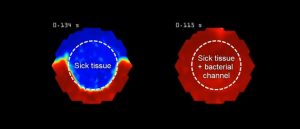Bacteria Can Return Excitability to Cells
In a new study, Duke University has discovered that cells they have harvested from bacteria, with a little work, can actually return cells to electrical signaling. This new research demonstrates that scientists can make cells more electrically excitable, which can be applied in a real clinical setting. The hope is to someday be able to use this research to treat scarred heart or nervous tissue, or to treat cardiac arrhythmia.

Cells derived from bacteria can help promote electrical signaling in human cells, according to new research out of Duke. The hope is to help with damaged heart and brain tissue.
The treatment would return electrical signaling to cells that are lacking that. For example, a cardiac arrhythmia is a condition where electrical impulses in the heart do not work properly. This kind of research could be extremely valuable in the treatment of this kind of disorder.
The research appeared in Nature Communications Oct. 18th, led by Hung Nguyen, Robert Kirkton, and Nenad Bursac. “These studies establish the utility of engineered BacNav channels for induction, control and recovery of mammalian tissue excitability,” the study says. This means that cells derived from bacteria, with a little tweaking, can result in promoting electrical signaling in cells.
The human genes responsible for a cell’s electrical activity are too large to be delivered to cells through a virus, the typical procedure. The Duke researchers decided to make smaller ion channels from bacterial genes to cells from humans in the lab. Because of the treatment, cells that don’t normally produce electrical signals did, and those that did so, did so more strongly.
Nguyen engineered the bacterial cells, so they would work in humans. There is nothing out right now that can promote excitability in brain and heart tissue, according to Bursac. In the experiment, they showed that delivering the genes to unexcitable cells would speed up the electrical signal across the channel.
The researchers also tried to mimic a medical emergency like a heart attack. In normal conditions, the electrical signals become silent. But, when adding the bacterial channel, they keep conducting electrical signals under perilous conditions, according to Bursac.
Their research is adding to the breadth of research that is using primitive organisms to help with human health. This is an exciting area of research, and we can’t wait to see what other kind of research comes out. Perhaps the most exciting aspect is the way it can heal damaged brain and heart tissue.